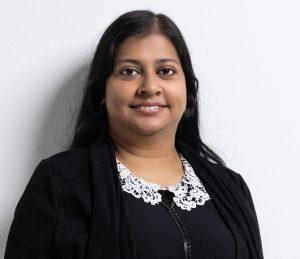 Who is Dr Rubina Bunjun and what is your current role at the University of Cape Town, (UCT), South Africa?
Who is Dr Rubina Bunjun and what is your current role at the University of Cape Town, (UCT), South Africa?
I obtained my PhD in 2016, examining the effect of HIV infection on TB immunity. I also completed my postdoc at UCT, which aimed to understand treatable factors of HIV risk in young women, including STIs and hormonal contraceptives. My current research focuses on understanding immunity to SARS-CoV-2 in Africa, namely, investigating pre-existing immunity to SARS-CoV-2 in adolescents, and immune dysfunction during “long COVID”. I am a Junior Research Fellow within the Institute of Infectious Disease and Molecular Medicine (IDM), based at the UCT Faculty of Health Sciences. I am passionate about science communication and an advocate for better mental health in academia.
You have been involved in TB, HIV and now COVID research. Which project/research topic do you feel has had the most impact on your career as an immunologist?
My career stages involved studying different pathogens- my PhD focused on TB, my postdoc on STIs and HIV, and I am currently leading my projects on COVID-19. I cannot untangle the work from the impact of the career stage. And of course, all of these diseases are important- particularly in Africa.
How easy have you found it to pivot into different aspects of immunology research?
The great thing about clinical immunology is that it is widely applicable to many different infections, as long as there is a solid understanding of basic human immunology. It does require a lot of new learning, but that is the fun part of being an academic.
What advice do you have for other scientists who have multiple interests and would like to be involved in different projects?
As an early career researcher, multiple interests are useful, but it is important not to spread yourself too thin. You need to find balance, and figure out how much direct involvement you will have, are you going to do the lab work yourself, or is it better to collaborate and co-supervise a student?
How have you gone about successfully juggling your research work with teaching and supervising students?
Since I am completely soft-funded, I don’t take on much of a teaching load. I give a total of up to 5 immunology lectures immunology a year. I also limit the number of students I supervise. My fellowships currently place limits on non-research activities, giving me much-needed research time.
In 2021, you became the first African scholar to receive the Dr John Gusdon Memorial New Investigator Award. How did you get to hear about the award and what impact has it made on your career development?
I generated some really cool data as part of my postdoc and submitted an abstract to present at the American Society for Reproductive Immunology meeting. The award is given to young scientists based on the quality of the work presented. It was my first young investigator award and was a much-needed confidence boost after the pandemic. In addition to making me visible, it also provided opportunities (press, networking, public engagement) that I would not have sought out myself.
Some people believe that moving to another university, country or continent is necessary for one to learn more and progress with their career. What do you have to say about being able to still be in South Africa and at UCT and making it to the point of being a research fellow?
Generally, I agree that spending substantial time in another institute or country is important for career growth. I must confess that I love Cape Town. I moved here for undergrad and obviously, I never left. This has not always been a positive thing, but I have tried to broaden my experiences as much as possible, in terms of different projects and international collaborations. That said, I am only a research fellow so I still have a very long way to go, and nobody can predict what the future holds.
When you are not busy making a difference in the healthcare sector, how do you like to wind down or enjoy Cape Town?
My favourite thing to do in summer is to have a long, lazy picnic with friends and a good book to read under a tree. In winter, I curl up under my blankets with my cats and a good book. I am trying to actively cultivate a healthy work-life balance, so, in addition to my obvious love of reading, I also go for walks in nature and regularly play Dungeons and Dragons with a lovely bunch of people.
Which researcher would you love to work with one day and what do you have as a dream assay you would like to carry out?
I first need to say that I have been lucky to work with some amazing researchers already! The researcher I would love to work with one day is the brilliant Akiko Iwasaki at Yale. I don’t have a dream assay, but that is because I have managed to do most of them already (confocal microscopy, 20+ colour flow cytometry, pathogen culture). I have a nightmare assay if that counts- Western Blots- I never, ever want to do another Western blot in my life, ever.
What do you see being the greater impact and application of your current research work on COVID-19?
Ultimately, I hope that my work will contribute to designing better COVID-19 vaccines and other interventions aimed at improving the lives of the people on our continent.
Interview by Vanessa Muwanga










